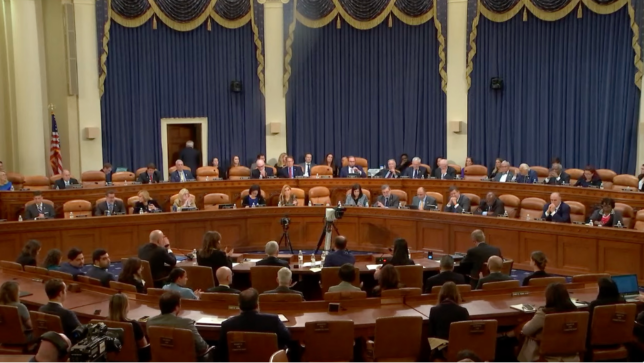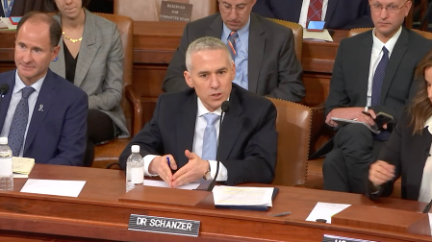Philanthropy
House Hearing on Antisemitism and Terror Financing Considers Purpose and Practice of Charitable Tax Exemption
Rep. David Schweikert: There are continuing congressional “conversations on charitable giving . . . and how we make sure it’s doing good in the world and not ultimately financing evil.”
 House Ways and Means Committee hearing, November 15, 2023.
Credit: YouTube.
House Ways and Means Committee hearing, November 15, 2023.
Credit: YouTube.

The U.S. House of Representatives Ways and Means Committee “has jurisdiction over the tax code” and must address “issues that have been laid bare in the aftermath of October 7th”—the date of Hamas’ horrific terror attack on Israel—according to the opening statement of its chair, Republican Rep. Jason Smith of Missouri, during a public hearing yesterday.
The first of these issues is the fact that “tax-exempt charities operating in the United States are providing support, encouragement, and potential financing to Hamas and Hamas-affiliated groups,” Smith continued as he began the hearing, entitled “From Ivory Towers to Dark Corners: Investigating the Nexus Between Antisemitism, Tax-Exempt Universities, and Terror Financing.” “This concern is not theoretical. In the early 2000s, the U.S. government identified and shut down the Holy Land Foundation in the United States. That foundation funneled $12.4 million from Americans to Hamas.
“Shockingly,” he went on, a public charity under § 501(c)(3) of the Internal Revenue Code “called American Muslims for Palestine, and its related (c)(4)” social-welfare group, “have been sued in federal court for operating as an alter ego of the Holy Land Foundation. The two groups have many of the same leaders and may be continuing the same efforts to support Hamas.”
In his testimony to the committee, Anti-Defamation League chief executive officer and national director Jonathan Greenblatt urged “the Internal Revenue Service (IRS) to conduct a thorough review of the tax-exempt status of any extremist organization,” as he put it in the prepared statement he submitted. “The IRS should also release guidance to colleges and universities so that they can ensure compliance” with existing law.
Democratic Rep. Mike Thompson of California later suggested a joint, bipartisan letter from Committee members to the Federal Bureau of Investigation (FBI) and IRS asking for just such a review, after which Democratic Rep. Earl Blumenauer of Oregon endorsed the idea, too.
Status and Support, Status Quo and Suggested Shifts
Overall, during questioning of the witnesses, almost all committee members decried the attack on Israel, as well as the antisemitism demonstrated in its wake, and the official tolerance if not encouragement of that antisemitism on campus. A number of members specifically inquired about issues surrounding the legal structure of tax-incentivized nonprofitdom and whether nonprofits in this context were conforming to the policy purpose of those incentives in their practices, as well as whether there might thus be a need for statutory reform or clarification.
Republican Rep. David Kustoff of Tennessee, for example, asked Foundation for Defense of Democracies senior vice president of research Jonathan Schanzer about H.R. 6408—a proposed bill of which Kustoff is the primary sponsor—to outright terminate the tax-exempt status of terrorist-supporting organizations. “I do see this as a very valuable tool, to revoke the tax-exempt status of these organizations,” said Schanzer, a former Treasury Department analyst of terrorism finance.

Jonathan Schanzer, senior vice president of research at the Foundation for Defense of Democracies. testifying in House Ways and Means Committee hearing. Credit: YouTube.
Arizona Republican Rep. David Schweikert, chair of the committee’s Subcommittee on Oversight, asked Schanzer how much money “from this country is actually leaking in to violence and functionally dystopian evil in the world?” Schanzer replied,
I will say this: in the 2000s, at the height of the War on Terror, we were doing a very good job of making sure that the nonprofit sector was not leaking in to the world of terrorism. In the last 10 or 12 years, we have seen a significant drop-off in actions taken against 501(c)(3)s here at home. … I’m sure that those men and women who are working in law enforcement are doing a great job on a range of other challenges, but I think we have probably lost the scent on a lot of them and I can tell you that there are a handful that we’re watching right now. …
I think we need to get back in the business of tracking these 501(c)(3)s. … Americans need to know who they’re giving their nonprofit dollars to and if they don’t, they run the risk of possibly supporting something that they don’t want to support.
Greenblatt chimed in. “Can I make a recommendation? Donor-advised funds—Schwab, Vanguard. These are the largest charitable organizations in the United States,” he said. “Their leadership should be brought in to ensure that they are not funneling funds to these terror-supporting organizations.”
To which Schweikert responded, “You’ll be happy to know the chairman and a couple of our members here, who actually sit on” the Intelligence Committee, “we’ve had side conversations on charitable giving … and how we make sure it’s doing good in the world and not ultimately financing evil ….”
A few other members also said tax-exempt status should not be given to or kept by groups involved, directly or indirectly, in the kind of recent antisemitic and violent activity discussed during the more than three-and-a-half-hour proceeding.
This article originally appeared in the Giving Review on November 16, 2023.


